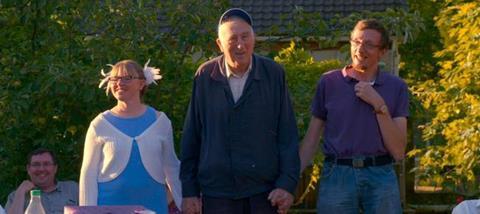
As a Catholic philosopher and humanitarian with a reputation for being a 'living saint', Jean Vanier is a strong subject for any filmmaker.
But in reality, Randall Wright’s new documentary Summer in the Forest isn’t a profile of Vanier. Instead its a tribute to his remarkable ministry – L’Arche.
L’Arche began in 1964 after Vanier met people with severe intellectual disabilities who had been locked away inside dilapidated psychiatric asylums. Moved by their plight, Vanier started L’Arche ('The Ark' in French) as a home for those with development disabilities.
Since those humble beginnings, L’Arche has now grown into a worldwide operation. The charity currently oversees 147 communities on all five continents. The documentary focuses on just two homes - the original L'Arche community (Val Fleuri, France) and Ma'an lil-Hayat in Bethlehem.
Rather than simply offer medical care, Vanier realised what was most needed was friendship. It’s Vanier’s unconditional love for those at the bottom of society and willingness to devote his life to living alongside them, which is so inspiring.
The 108-minute film is beautifully shot and includes a fully scored soundtrack. Director Randall Wright believes it may be the first film to apply such high quality production values while documenting the lives of those with intellectual disabilities.
The film takes time to portray its subjects with great dignity. As the film progresses we get to know Patrick, Andre, Michel and David and enjoy each of their unique personalities. We also watch as Celine and Fred fall in love with one another and plan to get married. It’s right that the documentary focuses on these people’s stories and portrays them so well.
But it’s unfortunate that Vanier himself doesn’t feature particularly heavily. Instead, the audience is left with a collection of stories with only brief narration and explanation from the founder. The lack of engagement with Vanier’s faith – or beliefs in general – is similarly disappointing. In an interview with Premier Christianity in 2015, Vanier explained, "The whole vision of Jesus is just to 'love one another as I have loved you'. To love people is not to do things for them, but to reveal to them that they have value. There’s a person under the abilities and the disabilities – that’s the heart [of L’Arche]” Given how Christ-centred L’Arche clearly is, it seems strange that the filmmakers have decided to refrain from engaging directly with the philosophy that drives the ministry. But if the film aimed to 'show' more than 'tell' then it has certainly succeeded.
This is a slow-paced film. There’s plenty of footage of residents simply go about their normal everyday life – brushing their teeth, eating meals, playing games etc. It’s makes for mundane viewing at times. But that’s the point. This film forces the viewer to slow down and consider that what might appear boring is actually profound.
One cannot help but be moved by the stories of these individuals who society so often ignores. But the challenge of Summer in the Forest isn’t merely to care for the disadvantaged. It’s to reframe the way we view others – whatever ability or disability they may have. The film challenges our individualism and our misplaced views of what 'success' means. The idea that the film will "change your life" – as the marketing bumpf suggests – is an overstatement. But Summer in the Forest is worth your time.
Despite winning the £1.1m Templeton Prize in 2015, Vanier isn’t well known outside of Catholic circles. This documentary should go some way to changing that. But more importantly, it will cause you to rethink what truly matters in life. And for that, we all owe a huge debt to Vanier’s life and work.
Summer in the Forest is in selected cinemas from 23rd June. Click here to download a free companion booklet from Damaris.
Click here to request a free copy of Premier Christianity magazine




























